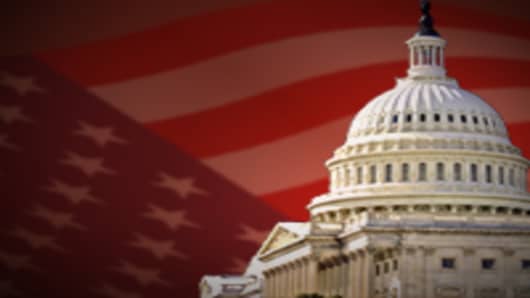In addition to the fallout for congressional Democrats, the economic and political turbulence of 2010 has also damaged public support for free trade.
A new NBC News/Wall Street Journal poll shows that 69 percent of Americans believe free trade agreements with other countries have cost jobs in the United States, while just 18 percent believe they have created jobs. A 53 percent majority—up from 46 percent three years ago and 30 percent in 1999—believes that trade agreements have hurt the nation overall.
Moreover, that rising skepticism extends across the political spectrum—a sign that continued trade expansion may be no easier for Republican leaders to promote if they regain control of Congress than it has been for Democrats.
While 65 percent of union members say free trade has hurt the U.S., so do 61 percent of Tea Party sympathizers. Democratic pollster Peter Hart and his Republican counterpart Bill McInturff, who conduct the NBC/WSJ poll, say the greatest shift against free trade has come among relatively affluent Americans, or those earning more than $75,000 a year.
That sentiment represents an obstacle for leaders of American business—who favor trade expansion—and for President Obama. His administration has made export expansion a key element of his economic strategy and is pushing, albeit belatedly, to complete a new trade deal with South Korea later this year.
On tax cuts, another key issue facing Congress, Americans are closely divided. Some 49 percent say they’d prefer that the Bush tax cuts expire for households earning more than $250,000 per year, while 45 percent say the cuts should be extended. In a question giving respondents two politically-charged alternatives—one asserting that extending tax cuts would require borrowing to benefit millionaires, the other asserting that higher taxes would “kill jobs”— the public split evenly, 47 percent to 47 percent.
The survey shows continued political challenges facing Democrats in midterm elections. Mr. Obama’s 46 percent approval rating, which ticked up from 45 percent in August, remains below the 50 percent threshold that historically has limited losses for the president’s party.
By 59 percent to 32 percent, Americans say the country is headed on the wrong track. Just 20 percent approve of the performance of Congress. The telephone survey of 1,000 adults, conducted Sept. 22-26, carries a margin for error of 3.1 percentage points.
The survey showed Americans evenly divided, 44 percent to 44 percent, on their preference for which party should control Congress. But it contained two modest signs of improvement in prospects for Democrats.
One is a slight turn up in economic optimism. About one-third of Americans expect the economy to improve in the next year, up from one-quarter in August. The other is rising interest in the election among African-Americans and Hispanics, two key Democratic constituencies.
At the same time, interest remains relatively low among younger voters, who played such a key role in Mr. Obama’s 2008 success. That may help explain why Mr. Obama is holding a large campus rally at the University of Wisconsin in Madison tonight.



